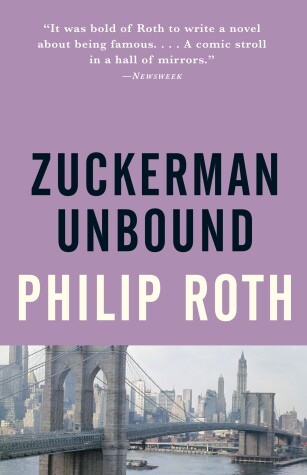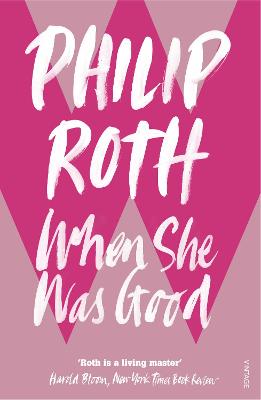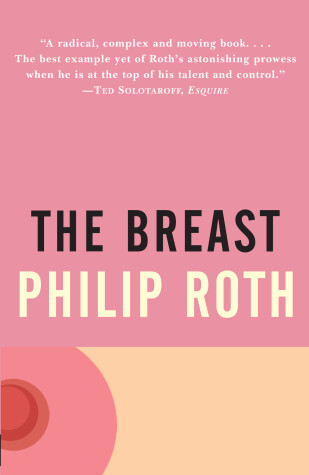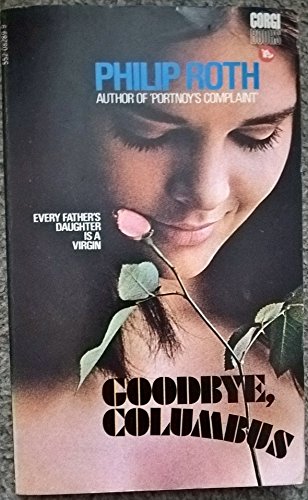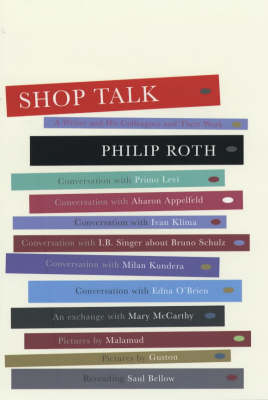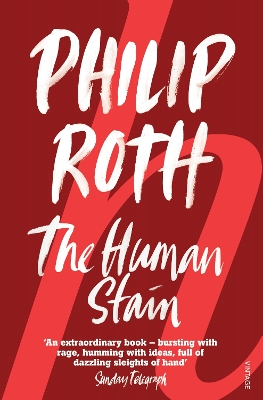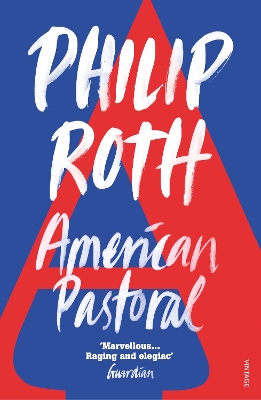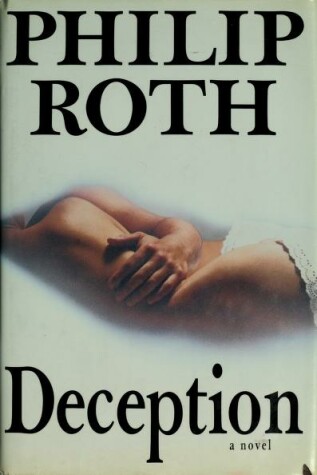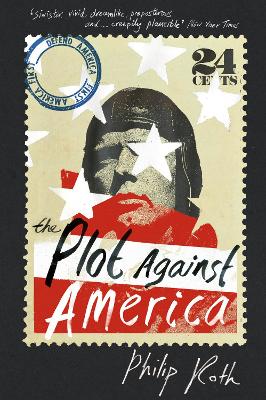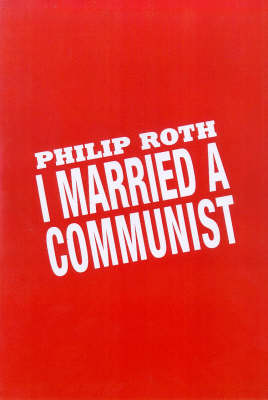Vintage International
31 total works
Now in his mid-thirties, Nathan Zuckerman, a would-be recluse despite his newfound fame as a bestselling author, ventures onto the streets of Manhattan in the final year of the turbulent sixties. Not only is he assumed by his fans to be his own fictional satyr, Gilbert Carnovsky ("Hey, you do all that stuff in that book?"), but he also finds himself the target of admonishers, advisers, and sidewalk literary critics. The recent murders of Robert Kennedy and Martin Luther King, Jr., lead an unsettled Zuckerman to wonder if "target" may be more than a figure of speech.
In Zuckerman Unbound, the notorious novelist Nathan Zuckerman retreats from his oldest friends, breaks his marriage to a virtuous woman, and damages, perhaps irreparably, his affectionate connection to his younger brother.
A deliriously funny yet touching exploration of the full implications of David Kepesh's metamorphosis—a daring, heretical book that brings us face to face with the intrinsic strangeness of sex and subjectivity.
"Hilarious, serious, visionary, logical, sexual-philosophical; the ending amazes—the joke takes three steps beyond savagery and satire and turns into a sublimeness of pity. One knows when one is reading something that will permanently enter the culture." —Cynthia Ozick, author of Antiquities
Goodbye, Columbus is the story of Neil Klugman and pretty, spirited Brenda Patimkin, he of poor Newark, she of suburban Short Hills, who meet one summer break and dive into an affair that is as much about social class and suspicion as it is about love. The novella is accompanied by five short stories that range in tone from the iconoclastic to the astonishingly tender and that illuminate the subterranean conflicts between parents and children and friends and neighbors in the American Jewish diaspora.
At its heart lies the marriage of Peter and Maureen Tarnopol, a gifted young writer and the woman who wants to be his muse but who instead is his nemesis. Their union is based on fraud and shored up by moral blackmail, but it is so perversely durable that, long after Maureen's death, Peter is still trying and failing to write his way free of it. Out of desperate inventions and cauterizing truths, acts of weakness, tenderheartedness, and shocking cruelty, Philip Roth creates a work worthy of Strindberg a fierce tragedy of sexual need and blindness."
Illuminating these lives in transition and guiding us through the book's evocative landscapes, familiar and foreign, is the miind of the novelist Nathan Zuckerman. His is the skeptical, enveloping intelligence that calculates the price that's paid in the struggle to change personal fortune and reshape history, whether in a dentist's office in suburban New Jersey, or in a tradition-bound English Village in Gloucestershire, or in a church in London's West End, or in a tiny desert settlement in Israel's occupied West Bank.
Shop Talk concludes with Roth's essay 'Rereading Saul Bellow', a vivid presentation of Bellow's achievement and, in the spirit of this collection, very much a colleague's reading.
Portnoy's Complaint n. [after Alexander Portnoy (1933- )] A disorder in which strongly-felt ethical and altruistic impulses are perpetually warring with extreme sexual longings, often of a perverse nature. Spielvogel says: 'Acts of exhibitionism, voyeurism, fetishism, auto-eroticism and oral coitus are plentiful; as a consequence of the patient's "morality," however, neither fantasy nor act issues in genuine sexual gratification, but rather in overriding feelings of shame and the dread of retribution, particularly in the form of castration.' (Spielvogel, O. "The Puzzled Penis," Internationale Zeitschrift für Psychoanalyse, Vol. XXIV, p. 909.) It is believed by Spielvogel that many of the symptoms can be traced to the bonds obtaining in the mother-child relationship.
'An extraordinary book - bursting with rage, humming with ideas, full of dazzling sleights of hand'- Sunday Telegraph
Philip Roth's brilliant conclusion to his eloquent trilogy of post-war America - a magnificent successor to American Pastoral and I Married a Communist
It is 1998, the year America is plunged into a frenzy of prurience by the impeachment of a president, and in a small New England town a distinguished classics professor, Coleman Silk, is forced to retire when his colleagues allege that he is a racist. The charge is unfounded, the persecution needless, but the truth about Silk would astonish even his most virulent accuser.
Coleman Silk has a secret, one which has been kept for fifty years from his wife, his four children, his colleagues, and his friends, including the writer Nathan Zuckerman.
It is Zuckerman who comes upon Silk's secret, and sets out to unearth his former buried life, piecing the biographical fragments back together. This is against backdrop of seismic shifts in American history, which take on real, human urgency as Zuckerman discovers more and more about Silk's past and his futile search for renewal and regeneration.
________________
PRAISE FOR THE HUMAN STAIN:
'One of the most beautiful books I've ever read' Red
'[A] tender, shocking and incendiary story on the failure of the American dream refracted through the prism of race' Guardian
'A masterpiece' Mail on Sunday
WINNER OF THE PULITZER PRIZE
Philip Roth’s masterpiece provides a piercing look into the promises of prosperity, civic order and domesticity in twentieth century America
‘Swede’ Levov is living the American dream. He glides through life cocooned by his devoted family, his demanding yet highly rewarding (and lucrative) business, his sporting prowess, his good looks. He is the embodiment of thriving, post-war America, land of liberty and hope. Until the sunny day in 1968, when the Swede’s bountiful American luck deserts him.
The tragedy springs from devastatingly close to home. His adored daughter, Merry, has become a stranger to him, a fanatical teenager capable of an outlandishly savage act of political terrorism that plunges the Levov family into the political mayhem of sixties America, and drags them into the underbelly of a seemingly ascendant society. Rendered powerless by the shocking turn of events, the Swede can only watch as his pastoral idyll is methodically torn apart.
Extraordinarily nuanced and poignant, American Pastoral is the first in an eloquent trilogy of post-war American novels and cemented Roth’s reputation as one of the greatest American novelists of the twentieth century.
‘Full of insight, full of sharp ironic twists, full of wisdom about American idealism, and full of terrific fun... A profound and personal meditation on the changes in the American psyche over the last fifty years’ Financial Times
'Disturbing, logical and very funny... In short, a masterpiece' New York Times Book Review
A ferocious political satire in the great tradition of Jonathan Swift and Mark Twain, Our Gang is Philip Roth's brilliantly acerbic response to the phenomenon of Richard M. Nixon.
In the character of Trick E. Dixon, Roth portrays an American president who outdoes the severest cynic; a peace-loving Quaker and believer in the sanctity of human life who doesn't have a problem with killing unarmed women and children. A master politician with an honest sneer, he finds himself battling the Boy Scouts, declaring war on pro-pornography Denmark, all the time trusting in the basic indifference of the voting public.
Tricky is the unprincipled self-seeker who hides his heartlessness behind the anaesthetising cliches of high office, whose public language is a merciless parody of that 'candid' Presidential prose which is merely double-talk, or as Orwell put it, 'pure wind'.
'This swift, elegant, disturbing novel...stands at the extreme of contemporary fiction' New York Times Book Review
He is a middle-aged American writer called Philip; she is an articulate, well-educated Englishwoman trapped in a loveless and humiliating marriage. In Philip's London studio, this play of voices - sharp, tender and inquiring - reveals both their past lives with startling clarity. Deception is fiendishly clever, as it dances with the conventions of the novel, and redefines the boundaries between fiction and reality.
The Ruppert Mundys, once the greatest baseball team in America, are now in a terminal decline, their line-up filled with a disreputable assortment of old men, drunks and even amputees. Around them baseball itself seems to be collapsing, brought down by a bizarre mixture of criminality, stupidity, and The Great Communist Conspiracy, aimed at the very heart of the American way of life.
In this hilarious and wonderfully eccentric novel Philip Roth turns his attention to one of the most beloved of all American rituals: baseball. Players, tycoons and the paying public are all targets as Roth satirises the dense tapestry of myths and legends that have grown up around The Great American Pastime.
'He captures better than anyone the collision of public and private, the intrusion of history into the skin, the pores of every individual alive' Guardian
'Though on the morning after the election disbelief prevailed, especially among the pollsters, by the next everybody seemed to understand everything...'
When celebrity aviator, Charles A. Lindbergh, wins the 1940 presidential election on the slogan of 'America First', fear invades every Jewish household. Not only has Lindbergh blamed the Jews for pushing America towards war with Germany, he has negotiated an 'understanding' with the Nazis promising peace between the two nations.
Growing up in the 'ghetto' of Newark, Philip Roth recounts his childhood caught in the stranglehold of this counterfactual nightmare. As America sinks into its own dark metamorphosis and Jewish families are torn apart, fear and uncertainty spread.
Who really is President Lindbergh?
And to what end has he hijacked America?
**ONE OF THE GUARDIAN'S 100 BEST BOOKS OF THE 21ST CENTURY**
'The Anatomy Lesson is a ferocious, heartfelt book - lavish with laughs and flamboyant inventions' John Updike
With his fortieth birthday receding into the distance, along with his hairline and his most successful novel, the writer Nathan Zuckerman comes down with a mysterious affliction - pure pain, beginning in his neck and shoulders, invading his torso, and taking possession of his spirit. Zuckerman, whose work was his life, finds himself physically unable to write a line.
He treks from one doctor to another, but none can find a cause for the pain and nobody can assuage it. Could it be, he wonders to himself, that the cause of the pain is nothing less than the books he has written?
As he grapples with this possibility, he tries an onslaught of painkillers, then vodka, and finally marijuana. He contemplates threatening the pain with suicide, attempting to scare it out of his system. He toys with the prospect of a dramatic career change. What will it take for the pain to finally leave him alone?
Newly discharged from the Korean War army, reeling from his mother's recent death, freed from old attachments and hungrily seeking others, Gabe Wallach is drawn to Paul Herz, a fellow graduate student in literature, and to Libby, Paul's moody, intense wife. Gabe's desire to be connected to the ordered "world of feeling" that he finds in books is first tested vicariously by the anarchy of the Herzes' struggles with responsible adulthood and then by his own eager love affairs. Driven by the desire to live seriously and act generously, Gabe meets an impassable test in the person of Martha Reganhart, a spirited, outspoken, divorced mother of two, a formidable woman who, according to critic James Atlas, is masterfully portrayed with "depth and resonance."
The complex liason between Gabe and Martha and Gabe's moral enthusiasm for the trials of others are at the heart of this tragically comic work.
The Dying Animal is vintage Roth fiction, a masterpiece of passionate immediacy. It is intellectually bold, forcefully candid, wholly of our time, and utterly without precedent - a story of sexual discovery told about himself by a man of seventy.
